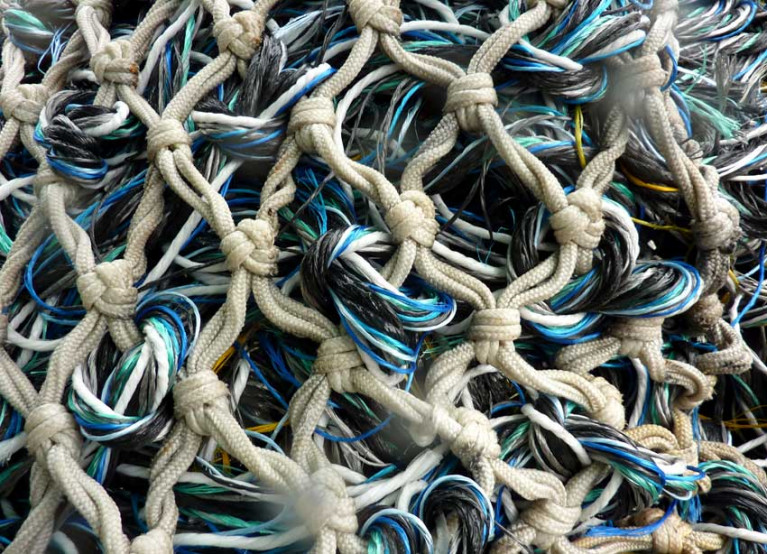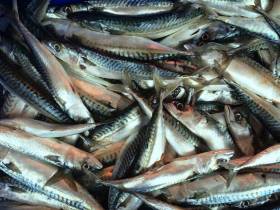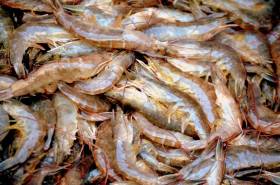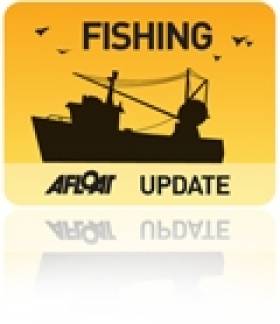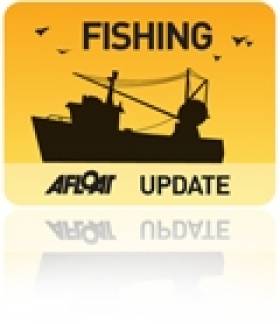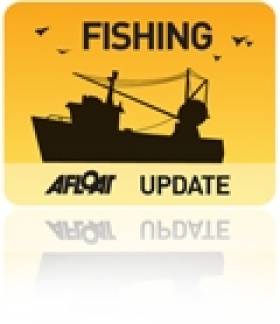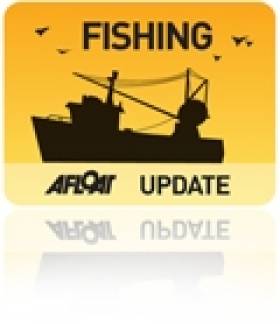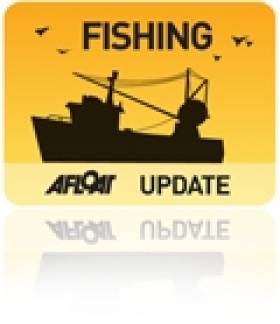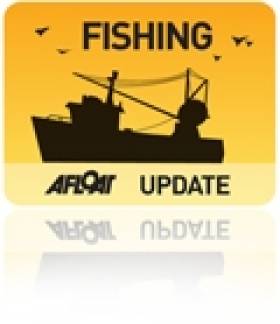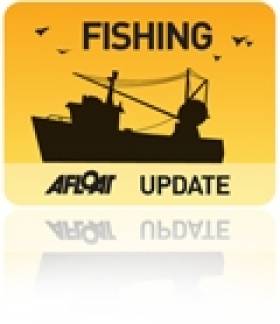Displaying items by tag: discards
Irish Fishing Fleet Discards for 2019 Include Over 30 Tonnes of Threatened Fish Species, Figures Show
Basking sharks and critically endangered skates were among the more than 30 tonnes of threatened fish species discarded by Irish fishing vessels in 2019.
The “shocking” figure is reported in a new investigation from TheJournal.ie’s Noteworthy strand, which looks into the impact of fishing on wildlife in Irish waters.
Concerning increases in cetacean strandings and the recent controversy around seal cull proposals in Co Kerry are also probed, but the story leads with a detailed breakdown of Ireland’s bycatch rates from 2019 data.
According to Padráic Fogarty of the Irish Wildlife Trust — who branded the numbers involved as “absolutely shocking” — the situation underscores “how flawed our system of management of the ocean is”.
However, the solution is far from clear-cut, as the chief executive of the Irish South and West Fish Producers Organisation warns that cracking down on discards will encourage fishers to skirt the rules.
“Don’t say ‘you’re discarding the fish, you’re killing them’, as what will they do? They’ll stop recording them,” Patrick Murphy said.
TheJournal.ie has much more on the story, which continues this week with a closer look at enforcement of rules in the industry as well as decision-making in the fishing sector.
#Fishing - Marine Minister Michael Creed held a key bilateral meetings on the margins of the Agriculture and Fisheries Council in Luxembourg this week with his Danish and Spanish counterparts to discuss Brexit and fisheries priorities.
Minister Creed met the Danish minister for fisheries Eva Kjer Hansen on Brexit, with both ministers agreeing to continue to work together over the upcoming critical period to deliver on the EU guidelines for a future relationship in respect of fisheries.
Minister Creed also held a bilateral with the Spanish Minister for Agriculture, Fisheries and Food Luis Planas Puchades to discuss development of CAP strategic plans, as well as key concerns with regard to Brexit.
“I welcome the understanding that both Ministers demonstrated in our discussions today with regard to Brexit and its impact on both the Irish agri-food and fisheries sectors,” said Minister Creed yesterday (Monday 15 October).
“There is a strong appreciation of the Irish concerns in the context of Brexit negotiations and I very much welcome the ongoing support provided by my Danish and Spanish colleagues in this regard.”
Ministers Creed and Planas also reviewed challenging issues facing both member states in advance of the full introduction of the discards ban on 1 January next and setting quotas at the December fisheries council that supports the practical delivery of this new policy.
Minister Creed addressed the setting of the mackerel total allowable catch (TAC) and quotas for 2019 in a situation where the scientific advice advocates a 61% cut from 2018.
Minister Creed said: “We need to take full account of the concerns from the scientists themselves about this year’s advice and take account of the socio-economic importance of the mackerel fishery when deciding on a TAC for 2019.
“We must work closely at an EU level with Norway and the Faroe Islands, our partners in the management agreement, to reach a balanced outcome that avoids undue inter-annual fluctuation in the management of the stock.”
#Fishing - Marine Minister Michael Creed has announced the launch of a scheme to promote the use of environmentally friendly fishing gear in the Irish prawn fishery.
The scheme has been developed between the department and the main fisheries organisations and is designed to help fishermen transition to fishing gear which help the phasing out of discards at sea.
The first phase of the scheme will operate for the period from September to November 2017 and will require operators to use exclusively fishing gear which has been approved by Bord Iascaigh Mhara (BIM) as more effective in releasing small prawns and small and/or quota limited whitefish such as cod, whiting, haddock and black sole. The vessels that come within the scheme will have access to an additional 20% of prawn quota.
“This scheme will help fishermen to catch marketable fish and avoid small and unwanted catches,” said Minister Creed. “Our fishing fleet is going through a period of massive change as we phase out the unacceptable practice of discarding fish at sea.
“The intention of the scheme is to promote the use of fishing gears that have demonstrated that they allow the escape of juvenile fish. The new gears have been developed by BIM and have been tested by BIM with fishing vessels.
“These gears have been found to be significantly more effective at letting small fish escape and in certain situations avoiding unwanted catches where quotas are low or the stock needs to be avoided for conservation reasons.”
Minister Creed added: “I am pleased at this progressive initiative from our fishing industry who are engaging fully to find better ways to fish that will support the conservation of fish stocks and the livelihoods of fishing communities around our coast.”
The closing date for receipt of applications for the scheme is Monday 21 August. Further information on the scheme and the application process is available HERE.
#Fishing - The captain of a Dutch factory ship has been found guilty by a jury at Cork Circuit Criminal Court of breaching EU sea fishery regulations, as The Irish Times reports.
Klass Dirk Meijvogel was in charge of the Wiron 5, one of two factory ships detained by the Naval Service after a routine inspection off the Blasket Islands on 12 February this year.
Sub Lt Niall McCarthy, who led the Naval boarding party on the vessel, told the court this week that he spotted an automatic grading system installed on Meijvogel's ship.
Systems of that kind allow for separating out smaller and less lucrative fish for dumping back into the sea - contravening EU rules against fish discards.
The Irish Times has much more on the story HERE.
New Rules For Fish Quotas & Ending Discards Must Be Introduced On Staged Basis Says Minister
#Fishing - Marine Minister Simon Coveney has outlined the major issues of importance for Ireland in the preparation for setting quotas for 2016 following the EU Commission presentation to Council of a policy document on its intended approach to setting fish quotas in 2016.
The Council of Ministers also agreed its position on the proposed regulations for the production and labelling of organic products at today's EU Agriculture and Fisheries Council meeting (Tuesday 16 June). The next step is to secure the agreement of the European Parliament to these proposals.
Speaking earlier today, Minister Coveney welcomed the fact that the state of fish stocks generally is improving and reiterated his commitment that all fish stocks should reach the target of maximum sustainable yield (MSY) by 2020.
He pointed out that “building fish stocks to maximum sustainable yield levels will benefit both the fishing industry and the environment and help secure the future.
"The fishing industry is facing into a period of change with the new policies agreed under the reformed CFP in 2013 now being implemented. The setting of fish quotas in line with new scientific rules is being rolled out and the discards ban for whitefish stocks will commence on 1 January 2016.
"I am working to deliver these new policies on a rational and progressive basis over the next four years so that we deliver fully on the commitment for a new fully sustainable fishing industry by 2020."
The minister added: “We must not apply these new policies as a 'big bang' in 2016. What I am seeking from the EU Commission is a step by step approach which will give industry time to adjust to the new approach.
"If we look to 2020 and beyond I am confident that we will have moved the industry to a much stronger situation with fish stocks rebuilt and the unacceptable practices of discarding fish at sea ended. I made clear to the Commission that 2016 should be an important step on the path and TACs must be set on this stepwise basis, incrementally applying the new scientific rules by setting TACs so as to reach maximum sustainable yields by 2020.”
A discards plan for whitefish stocks in the waters around Ireland has been agreed by EU member states following intensive negotiations chaired by Ireland. The plan, which was developed in consultation with stakeholders, involves the phasing in of the discards ban over the 2016 to 2019 period.
“The first phase of the implementation of the discards ban which comes into effect on 1 January 2016 will require adjustment and changed practices by the fishing industry," said Minister Coveney. "To support operators, the Department [of Marine] and marine agencies will work with them in finding practical approaches to adjust to this new policy and I am making funding available to help them meet the new challenges.”
Referring to the agreement reached on proposed regulations for the organic sector, the minister said he is "delighted we have reached agreement in Council on the regulations for the production and labelling of organic produce.
"This is particularly important for Ireland in light of the numbers who have applied for the Organic Farming Scheme under our Rural Development Programme announced earlier today by my colleague Minister of State Tom Hayes. These regulations provide clear rules for the organic sector and a good basis for negotiations with the European Parliament.”
Sean Kelly MEP: 'Support Fishermen in Implementing Fish Discards Ban'
#fishing – Sean Kelly MEP (Ireland South) has welcomed an agreement by EU Council Ministers to ban the practice by which fishermen discard or throw fish back into the sea when they exceed their quota. However, Mr Kelly stresses the need to ensure fishermen are supported throughout the ban's implementation.
"While the wasteful practice of discarding fish had to be banned, I welcome the fact that the ban will be introduced on a phased basis, allowing fishermen the chance to amend their methods of work," Mr Kelly said in Brussels today.
The ban will begin in January 2014 for pelagic stocks, surface fish such as mackerel and herring, moving onto the Baltic Sea by January 2015. Main demersal stocks such as hake and monkfish in the North Sea and the North and South Western waters will be covered by the ban from January 2016. In the last phase of the ban, the new rules will apply to fisheries in the Mediterranean, the Black Sea and all other Union waters on January 1st, 2017.
"This is an issue I have regularly raised at an EU level. I am keen to ensure that fishermen are supported in the transitioning period - so we need to see the details of a planned fund to help protect the livelihoods of fishermen as they change practices and begin to land what fish is caught. New equipment to improve the quality of the catch and help identify the type of fish will also be introduced."
Mr Kelly also repeated his concerns over the practices of Dutch-owned fishing vessels of the South West coast. There are allegations of illegal dumping at sea by these vessels which are only declaring what they land at port and not what is actually caught. Their ships are also understood to be equipped with 'mincers' which enables them to engage in what is called 'high grading' or picking out the smaller sized less valuable fish, mincing them and dumping them.
Mr Kelly understands that around 25-40 Dutch factory ships operate off Ireland and are owned or controlled by Dutch companies but not necessarily registered under the Dutch flag.
"We have to protect our valuable marine resources and protect the livelihood of Irish fishermen who are being driven out of business by the illegal and immoral practice of other fleets," Mr Kelly concluded.
Coveney Seeks Agreement From EU Marine Ministers On Discards Ban
#Fishing - Minister for the Marine Simon Coveney will be seeking agreement from his European colleagues at next week’s Fisheries Council on how when and how introduce an effective discards ban in the context of the reform of the Common Fisheries Policy (CFP).
At the June 2012 Fisheries Council, ministers did not reach agreement on how a discard ban would be implemented or when such a ban would be introduced.
The challenge for Minister Coveney as president of the European Council of Fisheries Ministers is to secure wide agreement at council on an ambitious early date for the introduction of a ban in all waters across the EU from the Baltic & North Sea to the North Eastern Atlantic, the Mediteranean and the Black Sea.
Ministers will need to agree the practical measures that will ensure that the ban is capable of being effectively implemented in all these areas.
In a review of global discarding, the Food and Agriculture Organisation of the United Nations (FAO) noted that the North East Atlantic has the highest discard level in the world, estimated at 1.3 million tonnes, the majority attributed to EU fisheries. The EU Commission itself estimates that 23% of all fish caught by EU vessels are discarded.
Discarding occurs in almost every fishery, in every area and across most fleets in the European Union. Every member state operating fishing operations on the open sea has a discard problem. Many member states have significant levels of discards in certain fisheries, and for varying reasons.
The policy to stop discarding of fish and to change behaviour of fishermen so that unwanted by-catches and juvenile fish are no longer caught must be seen as an integral part of fisheries management in general and serve the overarching goals of moving to long-term management based on ecosystem considerations and reaching maximum sustainable yield by 2015, where possible, and by 2020 at the latest for all stocks.
The three European institutions, all member states and importantly the Irish presidency are fully supportive and committed to the introduction of a discard ban.
A very important element of delivering the overall objective will be the introduction across all fisheries of smarter and more selective fishing gear, strengthened selectivity measures and changed fishing practices that avoid to the greatest extent possible unwanted catches particularly those of juvenile fish.
To assist the debate on discards and facilitate actions to resolve the problem, Ireland published a 'Discards Atlas' detailing the full extent of discards by the Irish whitefish fleet. It is critically important that other member states do likewise to support the introduction of the new policy and inform measures that will be needed to ensure that a new policy is fully implemented by EU fishing fleets.
Minister Coveney commented: "I am and continue to be a strong advocate for a policy which eliminates the wasteful practice of discards.”
On the prospects for council, he said: “I am under no illusion of the challenges the effective implementation of a discards policy pose for European fishermen and for the member states of the EU, and will work intensively with my European ministerial colleagues over the course of the February Council to deliver a policy with an ambitious timetable for implementation that will end the discarding of fish and support the rebuilding of fish stocks and the future of coastal communities depending on fishing.
"It is my firm belief that the success or failure of the reformed CFP will be judged to a large extent on the effectiveness of whatever discard ban is introduced and that there is widespread support for the ban from the fishing nations of the EU and their fishermen.
"It is imperative that European fisheries ministers collectively take this progressive but challenging decision now and co-operate in agreeing appropriate and effective measures to eliminate discards with ambitious timelines."
Agreement in the council will free up the Irish presidency, on behalf of the council, to begin negotiations with the European Parliament and Commission to reach political agreement on a new reformed Common Fisheries Policy by June.
EU Votes For Changes To Common Fisheries Policy
#FISHING - Minister for the Marine Simon Coveney has welcomed today's vote in the European Parliament to make amendments to the Common Fisheries Policy (CFP), as RTÉ News reports.
The vote comes just weeks before Ireland assumes its six-month EU Presidency term in January - and has been described by MEP Pat 'the Cope' Gallagher as significant step towards tacking the problem of discards in a practical manner.
Earlier this year Europe's fisheries ministers hailed a "breakthrough" deal on ending the practice of discards, whereby countless numbers of fish are thrown back into the sea under the quota system implemented by the CFP.
However, environmental groups criticised the timeline for implementation of the discards ban, as well as the "vague" wording of the proposed limits on fishermen.
Meanwhile, Minister Coveney was last month accused of "hypocrisy" by environmental groups for his support of fishing fleet subsidies that they argue would be used by bigger fishing countries like France and Spain to exploit dwindling stocks in Irish waters.
Markus Knigge, a consultant with environmental lobby group Ocean 2012, said Minister Coveney's position on the matter was a U-turn on his previous commitment to end the practice of discarding fish at sea.
The EU Fisheries Council, which runs from today till Thursday 20 December, will among other issues see quotas for the Irish fishing fleet decided for 2013.
Ireland is facing severe double-digit cuts in almost 30 different fish stocks considered vital to the Irish fishing industry.
The minister has described the negotiations as the "most difficult" in years.
Fisherman Defends Giveaway of Over-Quota Monkfish
#FISHING - A Wexford fisherman has defended the free giving away of monkfish to the public yesterday morning after exceeding an EU quota.
RTÉ News reports that Seamus O'Flaherty, owner of the trawler Saltees Quest, handed out the fish to hundreds of passers-by at Kilmore Quay rather than have the surplus catch thrown back into the water.
The vessel's skipper Jimmy Byrne defended the move as a protest against an EU rule that requires over-quota fish to be discarded at sea.
According to The Irish Times, officers with the Sea Fisheries Protection Authority, who observed the monkfish giveaway yesterday, have prepared a file for submission to the Director of Public Prosecution.
The authority said it found a large quantity of monkfish retained on the vessel which had been logged as having been discarded - and emphasised that catches landed that are not declared as discards are still counted against the national quota.
Byrne, meanwhile, described the practice of discards of dead fish as "crazy" especially when many people in Ireland are "going hungry".
He commented: “I have a certain quota of fish to catch and the monkfish end up getting caught. There’s more monkfish in Ireland than ever before. I can’t tell the monkfish not to go into the net."
The Irish Times has more on the story HERE.
Fishing Industry Welcomes Selective Nets, Grant Aid at Irish Skipper Expo
#FISHING - Minister for the Marine Simon Coveney briefed the Irish Skipper Expo in Galway last weekend on a new initiative promoting the use of selective conservation fishing nets, which allow young fish to escape.
Under the initiative in the Celtic Sea, additional quotas of up to 25% will be made available by the minister to skippers of Irish fishing boats which use an escape panel in their nets, allowing young whiting and haddock to escape.
The escape panel, developed by the Irish industry, has been endorsed at EU level and is expected to be a mandatory requirement later in the year.
Minister Coveney said on Saturday: “The use of this panel will significantly reduce discards of juvenile whiting and haddock in the Celtic Sea, allowing juvenile fish to grow and mature and contribute to increased stock size and returns for fishermen in future years.
"I believe that this offers an example of a practical approach to dealing effectively with the discards problem and retention of a flexible quota allocation system that we should take forward in the context of the Common Fisheries Policy Review."
In other news, Bord Iascaigh Mhara (BIM) announced €1.5 million in grant aid for the Irish fishing industry at the expo.
A spokesperson for BIM confirmed to the Galway Independent that the funding will be available to industry through a variety of schemes including fleet safety, seafood environmental management, lobster V-notching and coastal action groups.
Over 100 companies displayed their products and services to fishermen at the Irish Skipper Expo International 2012, held at the Galway Bay Hotel on 24-25 February.
- Fishing
- commercial fishing
- Minister for the Marine
- Simon Coveney
- Irish Skipper Expo
- Skipper Expo International
- 2012
- Galway Bay Hotel
- Galway
- conservation
- selective
- quota
- Celtic sea
- initiative
- discards
- grant aid
- Bord Iascaigh Mhara
- BIM
- Funding
- Coastal
- Seafood
- whiting
- haddock
- juvenile fish
- Common Fisheries Policy



























